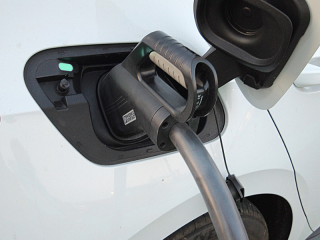
Electric vehicles are becoming increasingly popular, as drivers and businesses are looking for greener alternatives to petrol and diesel, particularly before the implementation of the UK Government’s 2030 ban.
Previously, we’ve provided an overview of electric vehicle maintenance to help prepare drivers who are considering making the switch to electric. However, EV batteries require a more in-depth analysis as drivers must understand how they work and know how to properly maintain them to prevent expensive breakdowns.
In this article, we will provide some top tips to effectively manage your EV battery, so that you can increase the longevity of the electric vehicles in your fleet.
What kind of batteries do electric vehicles use?
There have been many advancements in battery technology over the last 40 years and EV batteries are now capable of recharging quickly and regularly, plus have enough power to get drivers where they need to go with some vehicles able to achieve a range of up to 450 miles. There are two main types of batteries found in electric cars: lithium-ion batteries and nickel metal hydride batteries.
Most new electric vehicles use lithium-ion batteries as they can self-discharge, meaning they are unlikely to lose their charge when not being used. However, these batteries do tend to lose some of their capacity over the course of their lives which is why it’s so important that they’re properly maintained.
Nickel-metal hydride batteries are more commonly used in hybrid vehicles rather than EVs. They have a higher energy density than lithium-ion batteries, so they’ll last longer but they don’t charge as quickly which makes them less appealing.
How do I charge an EV battery?
Instead of needing fuel like a conventional petrol or diesel vehicle, EVs use electricity from the National Grid and must be recharged at a compatible charging point. Charge points can be installed in homes with a garage or driveway, or you can take advantage of the thousands of public charging points available across the UK.
To encourage drivers to switch to electric vehicles, the UK Government offers the EV charge point grant which helps to reduce installation costs. This grant provides funding of up to 75% towards the cost of installing electric vehicle smart charge points at domestic properties, allowing drivers to conveniently recharge their electric vehicle at home.
Before taking steps to install a charge point we highly recommend checking leasing agreements for the property as commercial and domestic leasehold properties may have restrictions in place which could lead to lease owners requesting removal of the charge point.
How long do EV batteries last?
EV batteries can last for many years and most EV manufacturers have warranties on their vehicles which guarantee that the batteries will last up to 8 years or 100,000 miles. Battery performance and longevity varies between manufacturers and models, so drivers will need to do their research before investing in an EV.
In addition, battery life is dependent on how the battery is maintained, its charging cycles, and the temperatures the vehicle is operated in. For this reason, many vehicles use heating and cooling systems to ensure the batteries are operating at an optimum level, helping to extend their lifespan.
Disposal of your EV battery
After several years of use, EV batteries will decline in their capacity and so will need to be repaired or replaced. However, if you have properly maintained your EV battery, this is usually covered by your manufacturer’s warranty.
It’s important that drivers dispose of their EV batteries correctly to help protect the environment. Fortunately, EV batteries can be recycled once they reach the end of their working life in your vehicle. This usually involves separating out its valuable materials, such as cobalt, lithium salts, stainless steel, copper, aluminium, and plastic and repurposing them for other jobs.
Recycled batteries are often used to store energy which can help to efficiently power homes.
Tips to maintain an electric car battery
Minimise rapid charging
Rapid chargers are a convenient option for drivers that need to recharge quickly. However, continual use can degrade the battery faster than if you used a slower charge, so it’s best to limit the use of rapid chargers, if possible. It’s better for the health of your EV's battery if you can charge your vehicle slowly, for example using a home charger overnight.Keep the “State of Charge” between 20-80%
Electric vehicles should not be charged to 100% or be allowed to reach 0% as this will drain the battery life. Instead, the “State of Charge” should be kept between 20-80% as this is when EVs will perform best. Drivers can adapt the settings of their vehicle or charger to ensure the battery charge is kept within this level and this will help to maintain the battery in your EV.Watch your speed
By driving slower, you can help to preserve your EV battery life. The faster you go, the more energy you use which will quickly drain your battery. Although it’s not always possible to drive slowly, taking alternative routes that allow you to do so will benefit your EV’s battery.Minimise exposure to extreme temperatures
It’s important to avoid parking your EV in a place that’s in direct sunlight as this will not only help to keep the interior of your vehicle cool but will also prevent your EV’s thermal management system from running whilst you’re away. If this occurs then your battery could overheat or drain which could have long-term implications, reducing the longevity of your battery. Cold temperatures can also have a negative impact as they’ll take longer to recharge and can reduce the range of your vehicle.Allow the battery to cool down before recharging
Allowing your EV’s battery to cool down before recharging keeps it at a neutral temperature which is integral to battery health. This can help to preserve the battery life and optimise the charge.
If your fleet contains electric vehicles, or if you’re considering making the switch to electric then apply for an EV charge card today. Alternatively, if you only have diesel or petrol vehicles then you can contact our team at 0113 202 5110 to discuss your fuel card options or use our quick comparison tool to determine which fuel card is best for your business.




